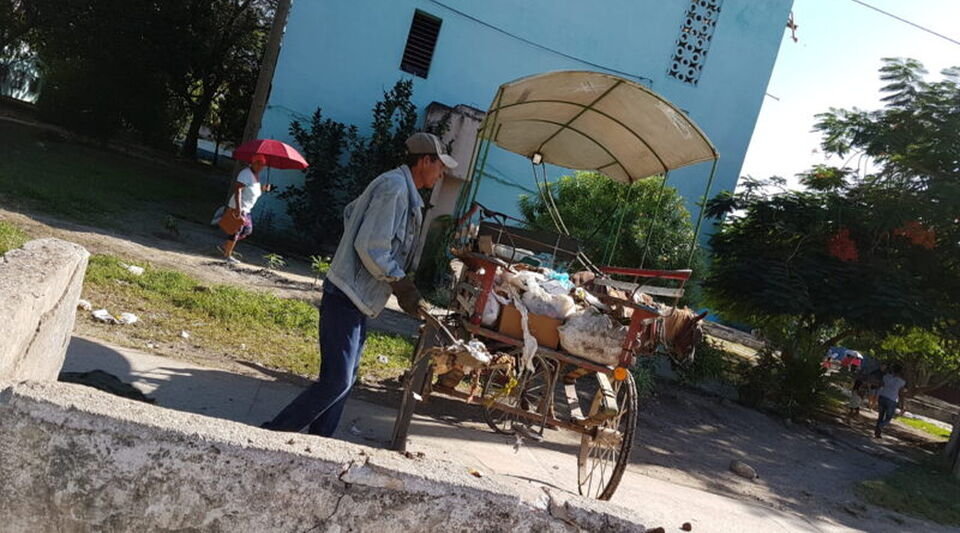Every morning, a fleet of 101 carters tries to empty the dumps and sweep the rubble from Las Tunas. This small city in eastern Cuba, with less than 170,000 inhabitants, produces 33,200 cubic meters of garbage per month. Community Services regret not have more collectors – an additional 146 wagons would be needed to begin a thorough cleanup of the city – but they are not willing to pay them more or improve the terms of their contract.
Truck drivers collect 86.2% of the garbage in Las Tunas, according to authorities. The rest should be transported in trucks, but the Provincial Deputy Director of Hygiene and Necrology Raúl Martínez Rodríguez – the same official who revealed the poor state of the funeral transport in the area – ensures that this does not work either.
The hygiene of the province depends on the self-employed truck drivers, who are already fed up with the government’s non-payments, the exaggerated taxes on their annual profit and the lack of supplies to keep their vehicle in good condition. That, without counting the hardness of the work, which implies handling waste without the slightest protection.
The motto of the most “rebellious” cart drivers is eloquent about their fatigue. They simply want to “earn more and sweat less.”
“I got rid of walking all day full of churre, at the risk of getting sick, because among the debris there are many things that can do harm and they check your papers over and over again”
“I got rid of walking all day full of churre, at the risk of getting sick, because among the waste there are many things that can do harm and they check your papers over and over again,” one of the workers told the official press. , which has already found an alternative in the private sector. “Now, rented, with a couple of good little runs a day, or dumping rubble from a construction site, I’m fine,” he says.
The workers could find working conditions more bearable if at least the government adequately compensated their work. On the contrary, state taxes and controls – they must deliver 15% of their annual income – increase every year and cause the rout towards private business.
The cost of the patent also increased and the process has become more complex, which complicates the incorporation of workers. In addition, keeping a horse alive and in shape on the Island is an “impossible” task, complain the cart drivers, who must obtain grass, equine accessories, ironwork and parts to repair the cart, in addition to constantly protecting it from gangs. illegal butchers that are so abundant in the Cuban fields.
Often, the State puts this type of input on sale, in addition to gloves, boots and work clothes, but since the drivers are self-employed, the authorities do not give them the right to buy.
“I stopped working for Comunales” is today, in Las Tunas and in other Cuban cities, a phrase that is pronounced as relief and is taken as a sign of prosperity in the union.
Martínez does not escape the rhetoric with which the Communal Services bureaucracy describes its problems and that the carretoneros no longer want to listen to.
Local officials, subject to the national bureaucracy, are slow to contain the stampede of their labor force. The law allows, in theory, the “canche to make changes” on which the hygiene of Las Tunas depends. Subdirector Martínez, however, justifies himself: “In addition to the obvious problems of lack of resources, social indiscipline is added constantly,” he says.
Martínez does not escape the rhetoric with which the Communal Services bureaucracy describes its problems and which the carretoneros no longer want to listen to. He claims to be working on a “tiered” and “progressive” payment system, although he admits to relying on “animal traction” given the low “availability coefficient” of trucks. The situation, admits the local press, is “unbearable” and the lack of flexibility with the self-employed will cause more casualties in the coming months.
With great discretion, the regime’s newspapers have addressed the “garbage crisis” on the island in recent weeks. “Not even 50% of the garbage generated daily is collected here.” assured an official reporter on the municipality of Habana del Este. 800 workers and nine trucks –with “breaks, lack of parts, tires and speed boxes”– also do not cover the hygienic demand of the area.
Other “overcrowded” municipalities in the capital have to wait 15 days before the Communal Services come to do their job. The solution, argues the journalist, does not lie in improving working conditions but in activating the “former inspectors” with greater severity.
________________________
Collaborate with our work:
The team of 14ymedio He is committed to doing serious journalism that reflects the reality of deep Cuba. Thank you for accompanying us on this long road. We invite you to continue supporting us, but this time becoming a member of our newspaper. Together we can continue transforming journalism in Cuba.


















